#Han Chinese
Text
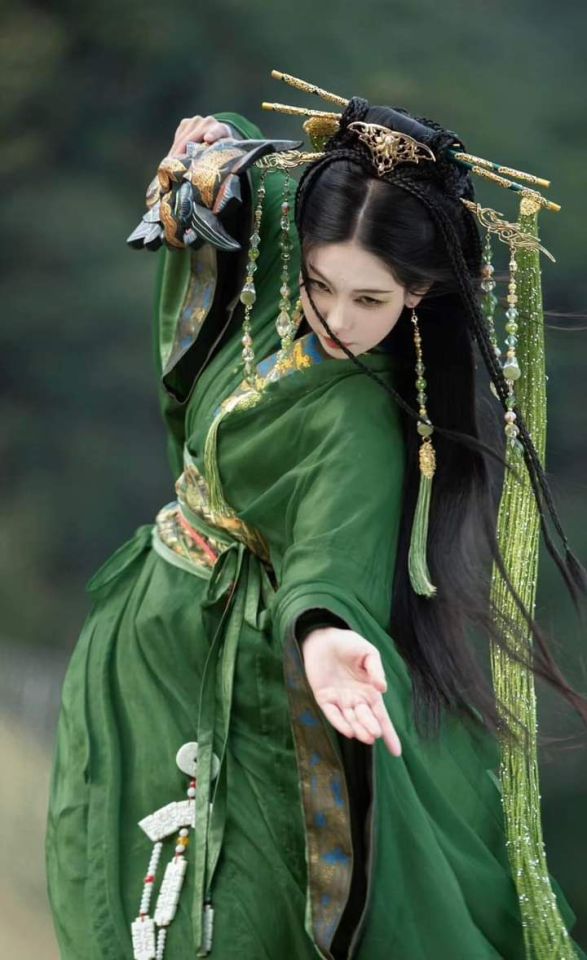
#china#chinese#fashion#green#hanfu#traditional#clothing#han chinese#princess#embroidery#elegant#jewelry#culture#hairstyle#royal#royalty#braids#tang dynasty#song dynasty#headpiece#凤冠#fengguan#headgear
145 notes
·
View notes
Text
Chinese Folk Religion: Snowy edition
Recent snow storms where I live has got me thinking: is there a deity responsible for snowfall and winter in traditional Chinese religion?
You got Frau Perchta/Holle in Germanic folklore, Yuki-Ona in Japanese Shinto folk beliefs, Skadi in Norse Paganism, and Morana in Slavic mythology, but I haven't ever heard of such a figure from my elders growing up.
So for this one, I had to actually use my limited Mandarin skills to do research, along with some help from more fluent family members and friends.
It turns out there are more than one traditional winter & snow deities in Chinese folklore. The reason I personally didn't hear of any is because, again, Chinese folk religion is extremely regional. There are central major deities that are uniform but the rest all differs from region to region. Han Chinese people have always spread out across several climate zones, from tropical to sub-arctic. Understandably, Gods and Goddesses associated with weather will differ from region to region. My Chinese side of the family hailed from a region where snowfall isn't very common, and winter isn't normally extreme. But look towards regions north of the Yellow River, and it's more upstream valleys in the Han Chinese heartland, it's a different story.
Teng'Liu: The Spirit of Snow and Frost
The first deity I can find is a figure named Teng'Liu (藤六). This is a male deity associated with snow itself. The "Liu" part if his name is the Chinese character for 6. Snowflakes typically have six arms/branches regardless of pattern. In Chinese numerology, the number 6 is also a number with "extreme Yin energy" (极阴). Snow itself is a thing with a lot of Yin energy too, as it's formed from water. Those familiar with Chinese cosmology should be familiar with the element's association with the cardinal direction of North. Which, again, is attributed with Yin. Thus explains why many forms of his folk names contains the number 6.
There is a folk ritual (which thankfully hasn't been practiced in over a century), which in Northern villages they used to offer up a young girl to this snow deity as a gift to appease him. The unfortunate girl would be tied up in a sack and left to the elements in the cold.
Teng'Liu occurs often in poetic works of literature as a stand-in for "snow". A fitting example is a work from Song dynasty writer and poet Yang Wanli, where he mentions "The Azure Lady pulls along Teng'Liu, as the Sun wilts away as she shakes (him)"** The meaning is obvious, but he mentions an Azure Lady, which takes us to another deity.
Qing'nu (青女): The Azure Lady
The second deity associated with snow and winter is a Goddess called Qing'nu, or "The Azure Lady", "The Lady in Turquoise", "The Lady in Blue", depending on the translation. She seems to be much more well-attested in ancient religious texts in addition to poetry and seems to predate the emergence of Teng'liu.
Attested in Huainanzi, a text compiled around 139 BC, "...three moons into autumn, Qing'nu emerges (from her home), and makes frost and snow fall..."
She is also mentioned as having white hair in a lot of classical Chinese poetry.
In traditional Chinese folk beliefs, Qing'nu resides in the moon and is a companion/handmaiden of the Moon Goddess Chang'E (嫦娥). Every year at the end of autumn, she will emerge from the moon palace to perform her duty: to bring winter, frost, cold, and snow. She will descend upon Mount Qing'yao (青要山), where she will bathe in the waters there to purify herself. She will then start playing her seven-stranded lyre and snow and frost will fall upon the earth to cleanse the land of impurities and diseases (until they come back next summer).
BTW Mt. Qing'yao is an actual mountain in Henan Province. The mountain itself does play a rather big role in traditional beliefs and in Taoism. In fact, there is a hill adjacent to the mountain named Qing'nu's Peak (青女峰), where on the peak there stands a pillar-like rock. In local folklore they say that lone pillar looks like a slender lady, standing atop the mountains looking down upon the earth. It marks where the Goddess herself stands every year to bring winter. The locals call it "the maiden's rock" (闺女石).
Legend has it there was once a gorgeous palace at the foot of this mountain where Qing'nu would stay in temporarily during winter. This could possibly be a reference to some type of structure used as a shrine or temple. Today only the spring that flowed in the palace remain. The very spring that, according to folklore, that the Goddess herself bathes in to purify herself. Today, young ladies from around would make pilgrimage to that spring to welcome her arrival on 14th day of the ninth month. A second pilgrimage would also be made on 13th day of the third month as she is supposed to leave and return to the moon. (the dates are the dates in the Chinese lunar calendar).
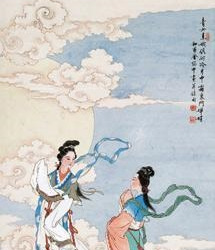
From these we can see while those deities are all associated with snow, they are seen by the people as very different. Teng'liu is very embodiment of the weather phenomenon, kind of like Jack Frost in American folklore. The fact there were rituals to appease him means that he is seen as a very unpredictable and volatile force. A spirit which has to be controlled under strict orders from a higher Celestial deity (天神): Qing'nu. Think of her as the Chinese counterpart to Frau Holle, a spirit attributed to making snow fall but not the snow itself. Or rather, think of those two like Helios and Apollo in Greco-Roman mythology. One being the sun itself and the latter being the one who pulls the sun across the sky.
This was fun, i hope all you folks who are trying to connect to their ancestral beliefs found this useful.
**translation might be off, sorry. Middle Chinese is difficult even for fluent speaker who studies old literature, plus this was Middle Chinese in it's poetic form.
#chinese folk religion#folklore#chinese folklore#history#ancestors#witchblr#witches of color#han chinese#chinese diaspora#folk taoism#chinese mythology#chinese religion#folk religion#polytheism#world religions
53 notes
·
View notes
Photo
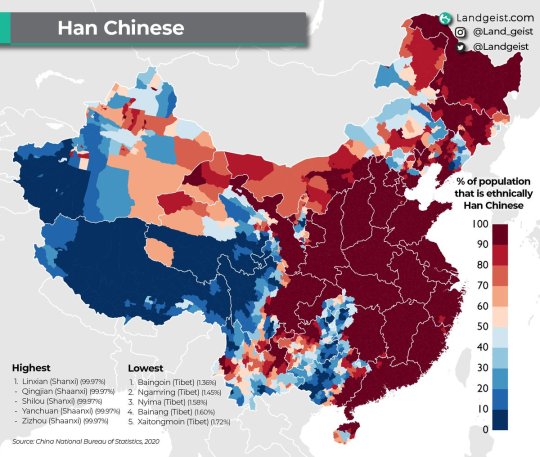
Share of Han Chinese across China.
Source and details >>
by landgeist
98 notes
·
View notes
Text

Han skirt, 1800-99, China.
41 notes
·
View notes
Text
[OPEN ACCESS] “How Taiwan Became Chinese: Dutch, Spanish, and Han Colonization in the Seventeenth Century” by Tonio Andrade
Table of Contents
Acknowledgments
Preface
Reader's Guide
Introduction
1. Taiwan on the Eve of Colonization
2. A Scramble for Influence
3. Pax Hollandica
4. La Isla Hermosa: The Rise of the Spanish Colony in Northern Taiwan
5. The Fall of Spanish Taiwan
6. The Birth of Co-Colonization
7. The Challenges of a Chinese Frontier
8. "The Only Bees on Formosa That Give Honey"
9. Lord and Vassal: Company Rule over the Aborigines
10. The Beginning of the End
11. The Fall of Dutch Taiwan
Conclusion
10 notes
·
View notes
Text
A lot of the times westerners say aw authorial govts wouldn’t do this shit and me as a Chinese am like. From an authoritarian country yeah like I couldn’t speak for other govts but yeah no my country could be ten times worse . like yeah I get not wanting to further imperialism by having a justification for war but like if America invades China I would join the side of America because China is so done for
#what ten entire years of brainwashing and banning outside information does to a country#mine#I watched my dad get more and more conservative#my mom is a teacher for 30 years and her students get more and more conservative in nationalistic frenzy every 3 years#I often say if we hand Chinese people do a mass suicide I would totally be down for it#han Chinese#because I don’t see like#how could like an entire country of nationalistic mouthpieces for the govt who are brainwashed for ten years#could regain human decency and compassion for the weak#in a culture that historically values hierarchy and admires the leaders#it’s not the result of me being mentally shit#it’s the result of debating a nationalist everyday for the past 5 years (minus the last bc I was in America) and my growing despair knowing#there are tens of hundreds of thousands like him#and he’s only on the milder end#I got lucky through doctor who literally I was like. hm tumblr sounds fun . so I got a vpn and joined tumblr joined Twitter and saw the#outside world#and when I was first on twitter in 2018 I was so sick of Chinese ppl who are anti ccp because I was raised a nationalist now I am one of#them#yeah tldr if we han Chinese ppl do a mass suicide I want to join!! it’s only right#hence why brax is inspirational for me. wow ur raised in a hopeless authoritarian govt around govt praisers and u commit suicide?? multiple#times even?? I want to be like u#suicide tw#aand American communists will take one look at me and say obviously she is brainwashed by the cia bruh I get my news from being Chinese .#I’m not even an immigrant bruh (I wish I am…)#like a lot of non brainwashed Chinese people on twitter say they want to kill themselves v often and it’s just. yeah .#political depression
5 notes
·
View notes
Text
Is China Racist?
Today’s article is going to be a little different I shall put forward some information I have on China and racism, and your own POV
Today’s article is going to be a little different from this blog. I shall put forward some information I have on China and racism, and I’m interested in what you, the reader, know is China racist.
I’m interested in your perspective and points of view on your understanding of China and race relations.
During the promotion of the new Star Wars trilogy starring John Boyega, who was one of the…

View On WordPress
#Black Panther#Century of Humiliation#Chadwick Aaron Boseman#China#Deng Xiaoping#Han Chinese#Is China Racist?#John Boyega#Racist
0 notes
Text

Han Chinese Kinship System Part I - Male-line Family (EN/CN)
Join my Discord fans group
See the full-sized watermarked charts on my Reddit
Please support me on Patreon
1 note
·
View note
Text
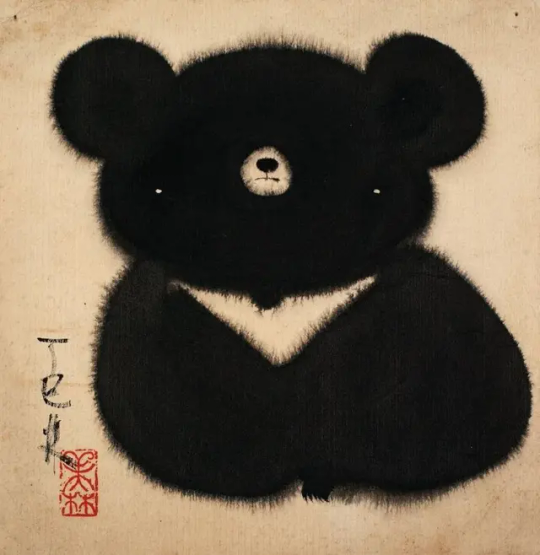
Han Meilin (Chinese, b. 1936), "Bear"
#Han Meilin#art#chinese art#asian art#painting#animal painting#animals in art#bear#bears#paintings#ink and color on paper#work on paper#animals#cute animals#chinese#black#ink#cute#contemporary art
2K notes
·
View notes
Text
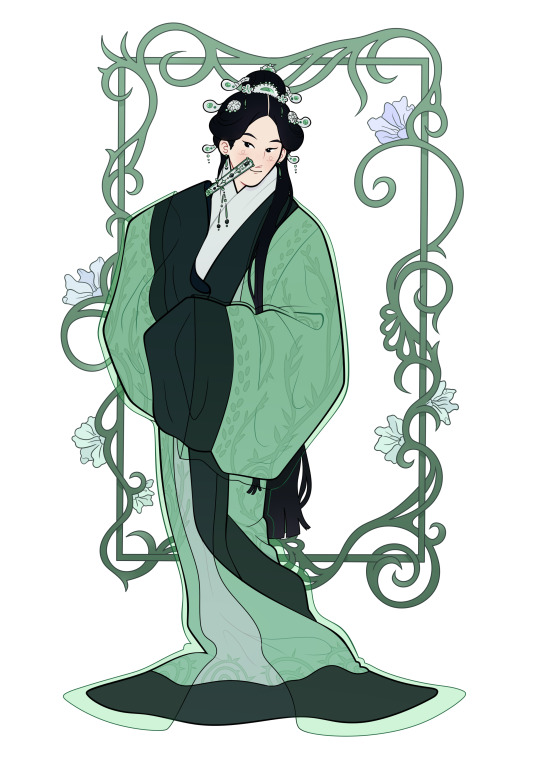
Notification: The peerless jade fairy of Cang Qiong's Mountain Sect is smiling! Looks like he's easily amused by his disciples' antics...!!! What a surprise!!! +300 Overwhelming Beauty Points!
Ok now for my silly little notes in fashion and other nonsense about this piece:
This is specifically Shen Yuan during the pre-abyss arc, mostly because I have a very, very different interpretation of him when he's already married to Binghe- Empress Shen is a whole other, much more decked out beast I will one day tackle.
His clothes are based on late Qin to early Han dynasty clothes for women, mostly because I can, and it seemed perfect for him; it's completely covered, and thus respectable and elegant! Nothing wrong to see here. It's also tight-er around the legs, which leaves things to the imagination...half of the mountain is definitely thinking about his long, slender, lily-white legs at any given time.
Is it technically crossdressing? Yeah, but it is a shitty Xia-Xia world, who's gonna stop me? Airplane? That guy would be on my side, actually.
The see-through outer robe is a flex, look at all that expensive fabric...just hanging off of him...a rich kid in one life a rich kid in all of them.
Binghe does his hair because he's terrible at it and can only do half-updo's or ponytails, he's too distracted by the mere thought of touching Shizun's hair to stop and think why Shen Qingqiu can't do it all of a sudden thankfully.
The hair, on a more serious note, is a bit more realistic to ancient-Chinese hair than an actual half-updo. Though it is more similar to late Han or Tang dynasties hairstyles than anything. Again, shitty Xia-Xia, don't play with me.
There's a little turtle in his fan because I think he'd be like awn that's so cute and either Liu Qingge or Yue QingYuan would be immediately like. I'll buy it!!! He acquires many-a-thing by simply looking cute and staring at it until one of them gets it for him I'm sure.
#art#digital art#artists on tumblr#my art#fanart#svsss#scum villain fanart#scum villain#scum villian self saving system#shen qingqiu#shen yuan#peerless cucumber#cucumber bro#han dynasty#chinese hanfu#hanfu accessories
915 notes
·
View notes
Text
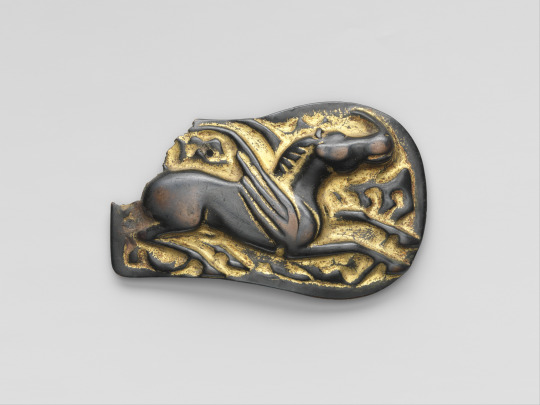

東漢(鮮卑文化) 鎏金翼馬紋銅飾板
~ Plaque with a Winged Horse.
Period: Eastern Han dynasty (25–220), Xianbei culture
Date: 1st century
Culture: North China
Medium: Gilt bronze
#ancient#ancient art#history#museum#archeology#ancient history#archaeology#china#chinese#ancient china#winged horse#horse#plaque with a winged horse#plaque#eastern han dynasty#xianbei#1st century
934 notes
·
View notes
Photo

Han skirt, 1870-1929, China.
71 notes
·
View notes
Text
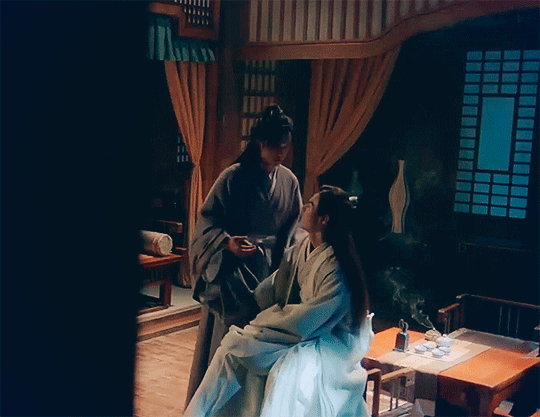
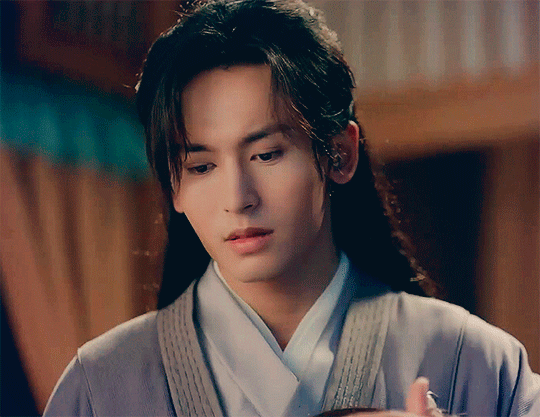

#Word of Honor#山河令#chinesemedia#CensoredBL#Bromance#CDrama#Chinese Drama#Gabriel makes stuff#Zhang Zhe Han#Zhou Zi Shu#Gong Jun#Wen Ke Xing#Zhou Zi Shu X Wen Ke Xing#WenZhou
662 notes
·
View notes
Photo
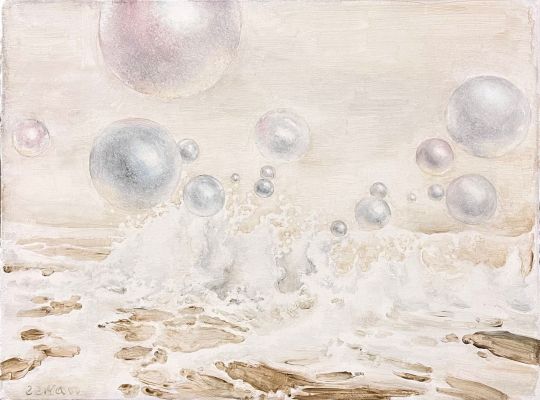
Han Jiaquan (Chinese, 1972), Waves #1, 2022. Oil on canvas, 30 x 40 cm.
4K notes
·
View notes
Text
[Hanfu · 漢服]Chinese Western Han (202 BC – 9 AD) Traditional Clothing Hanfu Photoshoot
“这个位子 我有何坐不得?”
“我欲问鼎天下,试问谁与争锋”
"Why can't I sit in this seat?"
"I want to conquer the world, who can compete with me?"
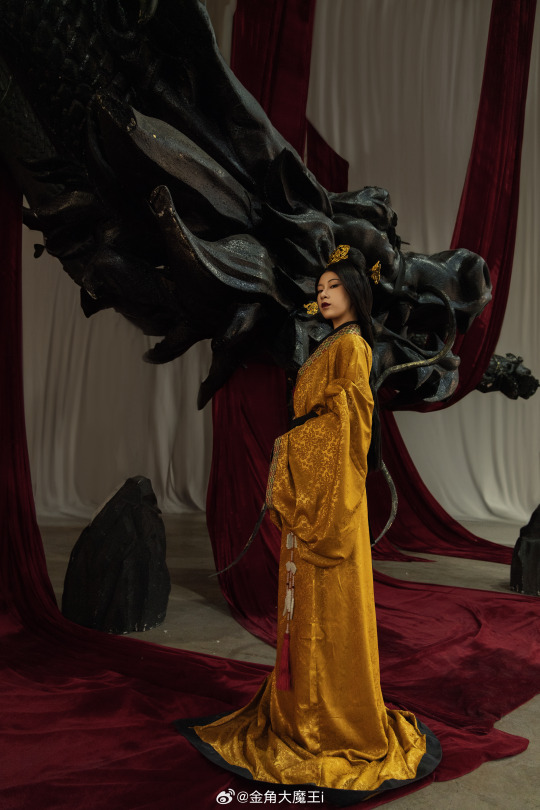
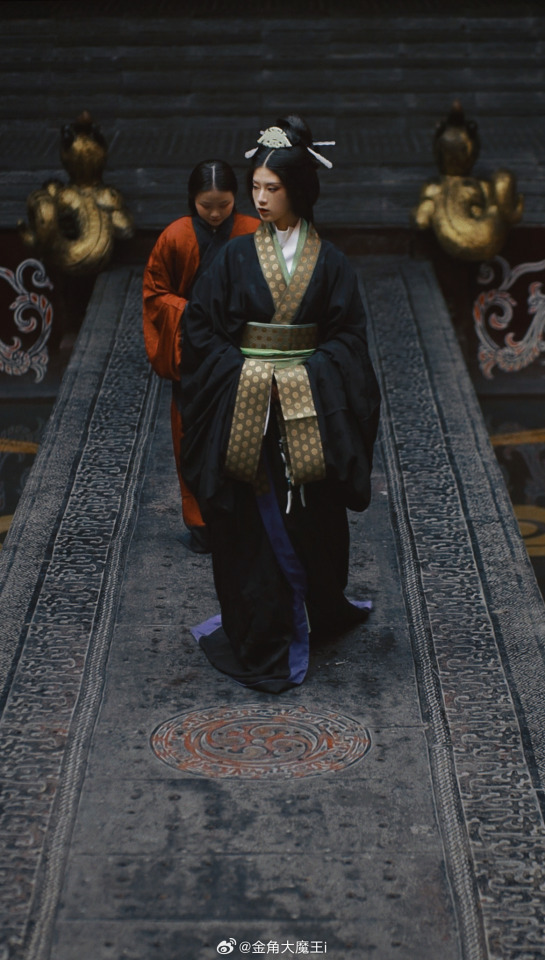
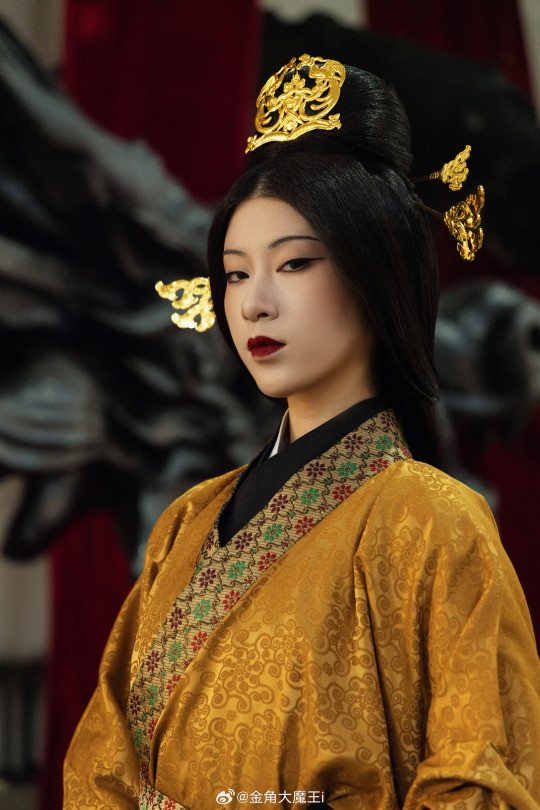
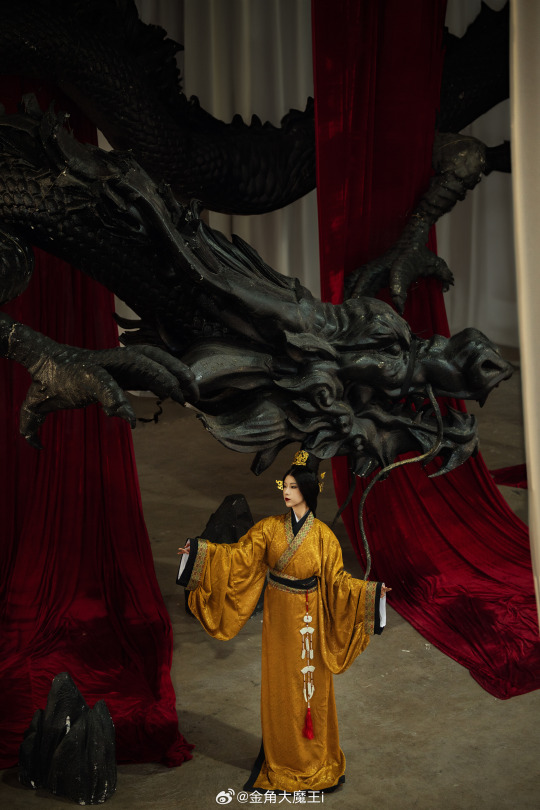

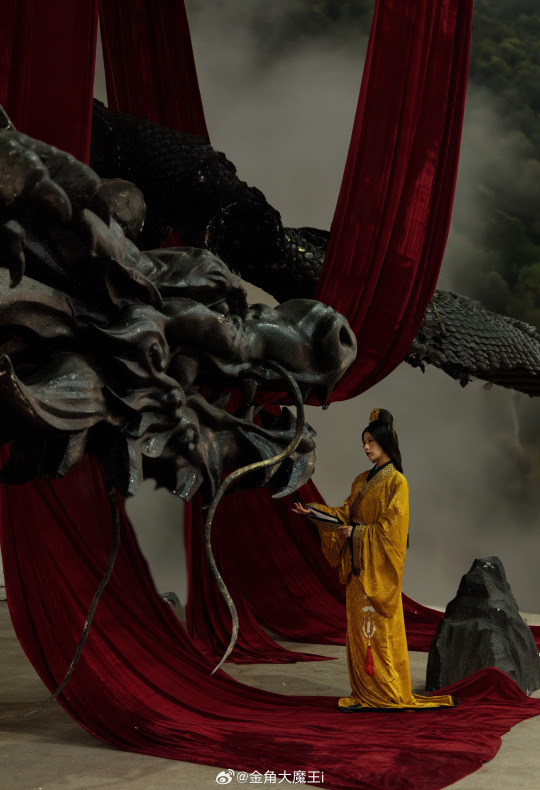


【About The First Empress of the Han Dynasty Empress Lü:Lǚ zhì(吕雉)】
Lü Zhi (241–18 August 180 BC), courtesy name E'xu (娥姁) and commonly known as Empress Lü (traditional Chinese: 呂后; simplified Chinese: 吕后; pinyin: Lǚ Hòu) and formally Empress Gao of Han (漢高后; 汉高后; Hàn Gāo Hòu), was the empress consort of Gaozu, the founding emperor of the Han dynasty. They had two known children, Liu Ying (later Emperor Hui of Han) and Princess Yuan of Lu. Lü was the first woman to assume the title Empress of China and paramount power. After Gaozu's death, she was honoured as empress dowager and regent during the short reigns of Emperor Hui and his successors Emperor Qianshao of Han and Liu Hong (Emperor Houshao).
She played a role in the rise and foundation of her husband, Emperor Gaozu, and his dynasty, and in some of the laws and customs laid down by him. Empress Lü, even in the absence of her husband from the capital, killed two prominent generals who played an important role in Gaozu's rise to power, namely Han Xin and Peng Yue, as a lesson for the aristocracy and other generals. In June 195 BC, with the death of Gaozu, Empress Lü became, as the widow of the late emperor and mother of the new emperor, Empress Dowager (皇太后, Huángtàihòu), and assumed a leadership role in her son's administration. Less than a year after Emperor Hui's accession to the throne, in 194 BC, Lü had one of the late Emperor Gaozu's consorts whom she deeply hated, Concubine Qi, put to death in a cruel manner. She also had Concubine Qi's son Liu Ruyi poisoned to death. Emperor Hui was shocked by his mother's cruelty and fell sick for a year, and thereafter no longer became involved in state affairs, and gave more power to his mother. As a result, Empress dowager Lü held the court, listened to the government, spoke on behalf of the emperor, and did everything (臨朝聽政制, "linchao ting zhengzhi"). With the untimely death of her 22-year-old son, Emperor Hui, Empress dowager Lü subsequently proclaimed his two young sons emperor (known historically as Emperor Qianshao and Emperor Houshao respectively). She gained more power than ever before, and these two young emperors had no legitimacy as emperors in history; the history of this 8-year period is considered and recognized as the reign of Empress Dowager Lü. She dominated the political scene for 15 years until her death in August 180 BC, and is often depicted as the first woman to have ruled China. While four women are noted as having been politically active before her—Fu Hao, Yi Jiang, Lady Nanzi, and Queen Dowager Xuan—Lü was the perhaps first woman to have ruled over united China.
Lü Zhi was born in Shanfu County (單父; present-day Shan County, Shandong) during the late Qin Dynasty. Her courtesy name was Exu (Chinese: 娥姁; pinyin: Éxǔ). To flee from enemies, her father Lü Wen (呂文) brought their family to Pei County, settled there, and became a close friend of the county magistrate. Many influential men in town came to visit Lü Wen. Xiao He, then an assistant of the magistrate, was in charge of the seating arrangement and collection of gifts from guests at a banquet in Lü Wen's house, and he announced, "Those who do not offer more than 1,000 coins in gifts shall be seated outside the hall." Liu Bang (later Emperor Gaozu of Han), then a minor patrol officer (亭長), went there bringing a single cent and said, "I offer 10,000 coins." Lü Wen saw Liu Bang and was so impressed with him on first sight, that he immediately stood up and welcomed Liu into the hall to sit beside him. Xiao He told Lü Wen that Liu Bang was not serious, but Liu ignored him and chatted with Lü. Lü Wen said, "I used to predict fortunes for many people but I've never seen someone so exceptional like you before." Lü Wen then offered his daughter Lü Zhi's hand in marriage to Liu Bang and they were wed. Lü Zhi bore Liu Bang a daughter (later Princess Yuan of Lu) and a son, Liu Ying (later Emperor Hui of Han).
Liu Bang later participated in the rebellion against the Qin Dynasty under the insurgent Chu kingdom, nominally-ruled by King Huai II. Lü Zhi and her two children remained with her father and family for most of the time during this period.
Even after Emperor Gaozu (Liu Bang)'s victory over Xiang Yu, there were still unstable areas in the empire, requiring the new government to launch military campaigns to pacify these regions thereafter. Gaozu placed Empress Lü Zhi and the crown prince Liu Ying (Lü Zhi's son) in charge of the capital Chang'an and making key decisions in court, assisted by the chancellor Xiao He and other ministers. During this time, Lü Zhi proved herself to be a competent administrator in domestic affairs, and she quickly established strong working relationships with many of Gaozu's officials, who admired her for her capability and feared her for her ruthlessness. After the war ended and Emperor Gaozu returned, she remained in power and she was always influential in many of the country's affairs.
In his late years, Emperor Gaozu started favouring one of his younger consorts, Concubine Qi(戚夫人), who bore him a son, Liu Ruyi, who was instated as Prince of Zhao in 198 BC, displacing Lü Zhi's son-in-law Zhang Ao (Princess Yuan of Lu's husband). Gaozu had the intention of replacing Liu Ying with Liu Ruyi as crown prince, reasoning that the former was too "soft-hearted and weak" and that the latter resembled him more. Since Lü Zhi had strong rapport with many ministers, they generally opposed Gaozu's decision but the emperor seemed bent on deposing Liu Ying. Lü Zhi became worried and she approached Zhang Liang for help, and the latter analysed that Gaozu was changing the succession on grounds of favouritism. Zhang Liang invited the "Four Whiteheads of Mount Shang", a group of four reclusive wise men, to persuade Gaozu to change his decision. The four men promised to assist Liu Ying in future if he became emperor, and Gaozu was pleased to see that Liu Ying had their support. Gaozu told Concubine Qi, "I wanted to replace (the crown prince). Now I see that he has the support of those four men; he is fully fledged and difficult to unseat. Empress Lü is really in charge!" This marked the end of the dispute over the succession and affirmed Liu Ying's role as crown prince.
In June 195 BC, Emperor Gaozu died and was succeeded by Liu Ying, who became historically known as Emperor Hui of Han. Lü Zhi was honoured by Emperor Hui as empress dowager. She exerted more influence during the reign of her son than she had when she was empress, and she became the powerful and effective lead figure in his administration.
Lü Zhi did not harm most of Gaozu's other consorts and treated them according to the rules and customs of the imperial family. For example, consorts who bore male children that were instated as princes were granted the title of "Princess Dowager" (王太妃) in their respective sons' principalities. One exception was Concubine Qi, whom Lü Zhi greatly resented because of the dispute over the succession between Liu Ruyi (Qi's son) and Liu Ying. Liu Ruyi, the Prince of Zhao, was away in his principality, so Lü Zhi targeted Concubine Qi. She had Qi stripped of her position, treated like a convict (head shaved, in stocks, dressed in prison garb), and forced to do hard labour in the form of milling rice.
Roles in the deaths of Concubine Qi and Liu Ruyi
Lü Zhi then summoned Liu Ruyi, who was around the age of 12 then, to Chang'an, intending to kill him together with his mother. However Zhou Chang (周昌), the chancellor in Liu Ruyi's principality, whom Lü Zhi respected because of his stern opposition to Emperor Gaozu's proposal to make Liu Ruyi crown prince, temporarily protected Liu Ruyi from harm by responding to Lü Zhi's order that, "The Prince of Zhao is ill and unfit for travelling over long distances." Lü Zhi then ordered Zhou Chang to come to the capital, had him detained, and then summoned Liu Ruyi again. Emperor Hui tried to save Liu Ruyi by intercepting his half-brother before the latter entered Chang'an, and kept Liu Ruyi by his side most of the time. Lü Zhi refrained from carrying out her plans for several months because she feared that she might harm Emperor Hui as well.
One morning in the winter of 195-194 BC, Emperor Hui went for a hunting trip and did not bring Liu Ruyi with him because the latter refused to get out of bed. Lü Zhi's chance arrived, so she sent an assassin to force poisoned wine down Liu Ruyi's throat. The young prince was dead by the time Emperor Hui returned. Lü Zhi then had Concubine Qi killed in an inhumane manner: she had Qi's limbs chopped off, eyes gouged out, ears sliced off, nose sliced off, tongue cut out, forced her to drink a potion that made her mute, and had her thrown into a latrine. She called Qi a "human swine" (人彘). Several days later, Emperor Hui was taken to view the "human swine" and was shocked to learn that it was Concubine Qi. He cried loudly and became ill for a long time. He requested to see his mother and said, "This is something done not by a human. As the empress dowager's son, I'll never be able to rule the empire" From then on, Emperor Hui indulged himself in carnal pleasures and ignored state affairs, leaving all of them to his mother, and this caused power to fall completely into her hands.
When Lu first came to the court, she planned to establish the Lu family members as "kings (nobles)". This was not only to commemorate her deceased relatives, but also to strengthen her power in the court. However, Wang Ling, the prime minister at the time, immediately pointed out that the great ancestor Liu Bang(Husband of Lu, founding emperor of Han Dynasty)once killed the white horse and agreed that "if someone who are not Liu family be come the king, the whole world should attack them." Therefore, the move of establishing a foreign surname as the king violated the ancestral system established by Liu Bang and was really inappropriate.
Faced with the obstruction of Wang Ling, Empress Lu responded by deposing him and insisting on honoring her deceased father and two brothers as King Lu Xuan, King Wu Wu, and King Zhao Zhao. After setting this precedent, Lu was out of control. She not only named her three nephews Lu Tai, Lu Chan, and Lu Lu as King Lu, King Liang, and King Zhao respectively, but also named her grandnephew Lu Tong. He was the King of Yan, and his grandson Zhang Yan was granted the title of King of Lu.
In addition, there are also quite a few people with the surname Lu who have been granted the title of marquis. As a result, it can be said that many princes surnamed Lu appeared in the court in the blink of an eye. They controlled the government and became the cornerstone and support for Empress Lu to control the right to speak in the court.
Empress Lu's life was emblematic of the intricate power dynamics of the Han Dynasty in ancient China. Born into a modest family, Lu rose to prominence through her marriage to Emperor Gaozu. Her astute political acumen and strategic alliances allowed her to wield significant influence behind the throne. As the mother of several emperors, she orchestrated their ascensions and manipulated court politics to consolidate power for her family. However, her ruthless pursuit of control and elimination of rivals earned her both admirers and enemies. In the end, her ambitions led to her downfall, as her unchecked power and manipulation of succession angered the nobility.As a result, after her death, the Lu family was retaliated and killed by the nobles and courtiers who supported the Han Dynasty, and the family was almost exterminated.Empress Lu's life illustrates the delicate balance of power, ambition, and intrigue in ancient Chinese imperial courts.
Literati in every dynasty in China often likened women who attempted to participate in government affairs and influence national policies to Empress Lü, saying they were vicious. One of them was Wu Zetian, the first official female emperor of China. However, compared with Empress Lü, Wu Zetian was more talented. Unlike Empress Lü, who was simply vicious, she ignored the system and stability of the empire and put personal and family interests first.
________________
📸Photo & Model :@金角大魔王i
🔗Weibo:https://weibo.com/1763668330/NFVOXthxX
________________
#chinese hanfu#Western Han (202 BC – 9 AD)#hanfu#Empress Lü#Lǚ zhì(吕雉)#china history#chinese history#hanfu accessories#hanfu_challenge#chinese traditional clothing#china#chinese#woman in history#漢服#汉服#中華風#金角大魔王i#historical fashion
295 notes
·
View notes
Text
Dao and Guandao by amazing Sifu Han Liang 🥰🔥
#kung fu#wushu#han liang#chinese martial arts#martial arts girls#kung fu girl#martial arts weapons#guan dao#Dao
777 notes
·
View notes